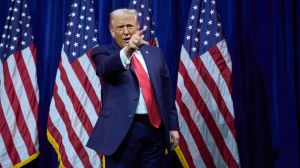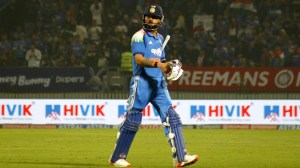Left in the Centre
The elections have thrown up expected results. Watch for unexpected consequences

The people have spoken and the results of the five states which went to polls are for all to see. Even as it is de rigeur to claim that the electorate is all-wise and that final results invariably go on to strengthen democracy, the systemic implications of the mini-general elections may carry seeds of surprise. True, for once, the psephologists have covered themselves with some credit, with the final tally in different states conforming closely to exit poll predictions.
Even more surprising, barring Tamil Nadu, is the close correspondence between opinion and exit polls. Most poll pundits were before final voting unwilling to take bets on the state 8212; 8220;too close to call8221;. Why the final verdict is so heavily loaded in favour of the DMK-led alliance remains at the moment a mystery. After all, during the campaign, most observers agreed that while the DMK alliance was a more formidable arithmetic coalition, Jayalalithaa had chemistry on her side and had managed to overcome the negativity associated with her 2004 parliamentary drubbing. Surely, the state8217;s tradition of alternating governments alone cannot explain the verdict. For a more meaningful political analysis, we will have to wait.
West Bengal and Kerala, despite delivering expected verdicts 8212; massive mandate for the Left Democratic Front 8212; carry a sting that may have unforeseen consequences. Other than the fact that they belong to the same party, Achyutanandan and Buddhadeb Bhattacharjee seem to inhabit different universes. True, both are 8220;loyal8221; to the party, enjoy a deserved reputation for honesty and personal austerity and rarely speak out of turn. Yet, both also display an individualistic streak, and seem in favour of economic policies that pull them in different directions.
The Kerala comrade, unlike his state party secretary, is hardly enamoured of liberal reforms, is hostile to entry of foreign private capital and seems reluctant to be enthusiastic about the more modern and vibrant sectors of economic growth 8212; be it tourism or IT. Buddhadeb Babu, on the other hand, promises a departure from more conventional Left Front strategies in West Bengal 8212; a renewed focus on urban growth and modern industry, greater autonomy to knowledge production centres, and a willingness to woo large domestic and foreign capital. How all this will square up with the Left Front postures at the Centre, with the 8220;comrades8221; opposing all initiatives of the Manmohan Singh-P. Chidambaram-Montek Singh Ahluwalia combine, should be grist to editorial writers in the days ahead.
The more important story of these elections is the continuing inability of the two major national parties 8212; the Congress and the BJP 8212; to reverse their slide-back. The BJP and Parivar affiliates have, ever since they lost power at the Centre, been in a disarray. An ageing senior leadership, factional wars in generation next and, most recently, the loss of Pramod Mahajan 8212; fund raiser and networker 8212; are not designed to increase confidence and enthuse cadres. And now, with lacklustre response to their Suraksha Yatras and Uma Bharti going her own way, the party may well reduce to double figures by the next elections.
The state of the BJP provides at best cold comfort to the Congress. It has failed to become a significant opposition in West Bengal despite contesting many more seats, lost Kerala convincingly fallout of factional battles? and experienced reverses in Assam, though it has indeed emerged as the single largest party. And though much will be made of its role in the DMK alliance8217;s victory in Tamil Nadu and retaining Pondicherry, the fact that it continues to be a side player is undeniable. Clearly, attempts at showcasing the 8220;achievements8221; of the UPA government or the renunciation and sacrifice of Sonia Gandhi are insufficient to move the electorate to the extent that the party loyalists claim.
Little, however, is likely to happen in a hurry and for the moment the Manmohan Sinh government remains secure. And yet the signs for the future are disturbing. For one, an emboldened Left will seek to extract a higher price for its continuing support; trying to reopen the airport privatisation issue is an indication. Already the Left has signalled its opposition to any talk of price hike in petroleum products, forget the stalled issues of economic reform. The actual trajectory of the Left assault will, however, depend upon what assessment the CPIM makes of its victories in West Bengal and Kerala, and therein lies an opportunity for the Congress. If only it can come up with more imaginative policies to pursue growth with equity and employment, it may be able to deflect the more genuine criticism by the Left. But, this also presupposes that the Congress can re-invigorate itself, bring in fresh faces and ideas in both its organisation and ministry, and learn not to work at cross-purposes with different power centres more keen to undercut one another than display a cohesive purposiveness. And that for a party whose primary cementing force is genuflection to the leader is a tall order.
In a sense, it would be presumptuous to make too much of these results. For that we will have to wait for the next battle 8212; the control of Uttar Pradesh. If the Congress, currently a marginal presence, fails to effect a recovery and capitalise on the unraveling of the BJP and the steady discrediting of the Samajwadi Party 8212; for instance, making it to second place in the seat stakes 8212; its claim of being a central pole of our electoral democracy will appear hollow. True, there are today few takers for a Third Front. But with the BJP on a downward slide, thereby reducing the chances of a communal makeover, and the Congress absent in large parts of the country, that prospect may continue to exercise allure for some.
Looking back at the entire political process, what is striking is the dissonance between policies, poll promises and the strategic alliances that different parties strike with each other to forge winning combinations. Equally disconcerting is the continuing need for an escalated role for the Election Commission to lend credibility to the poll process. It is almost as if our political parties, the central agents in the making of our democracy, still cannot be trusted to play fair game. Finally, the veritable absence, in a demographically young country, of a forward-looking programme designed to attract the youth. This says very little for the future.
The writer is consulting editor, 8216;Seminar8217;
seminarvsnl.com
- 01
- 02
- 03
- 04
- 05































